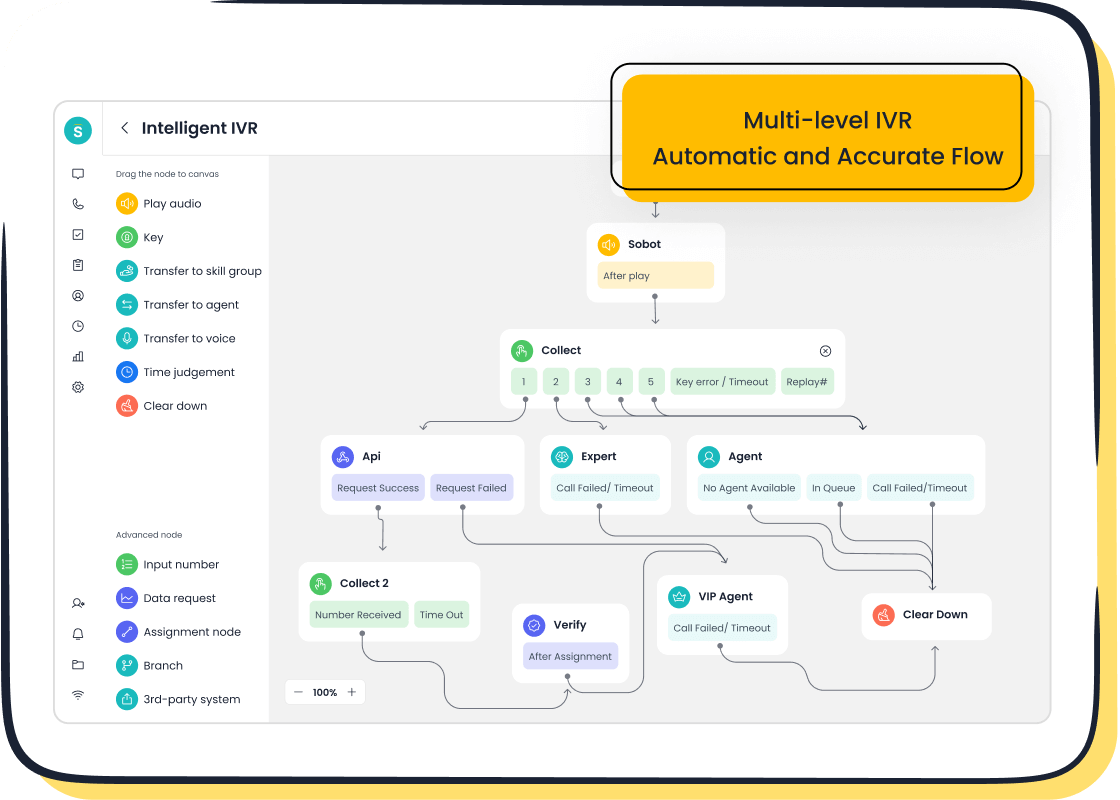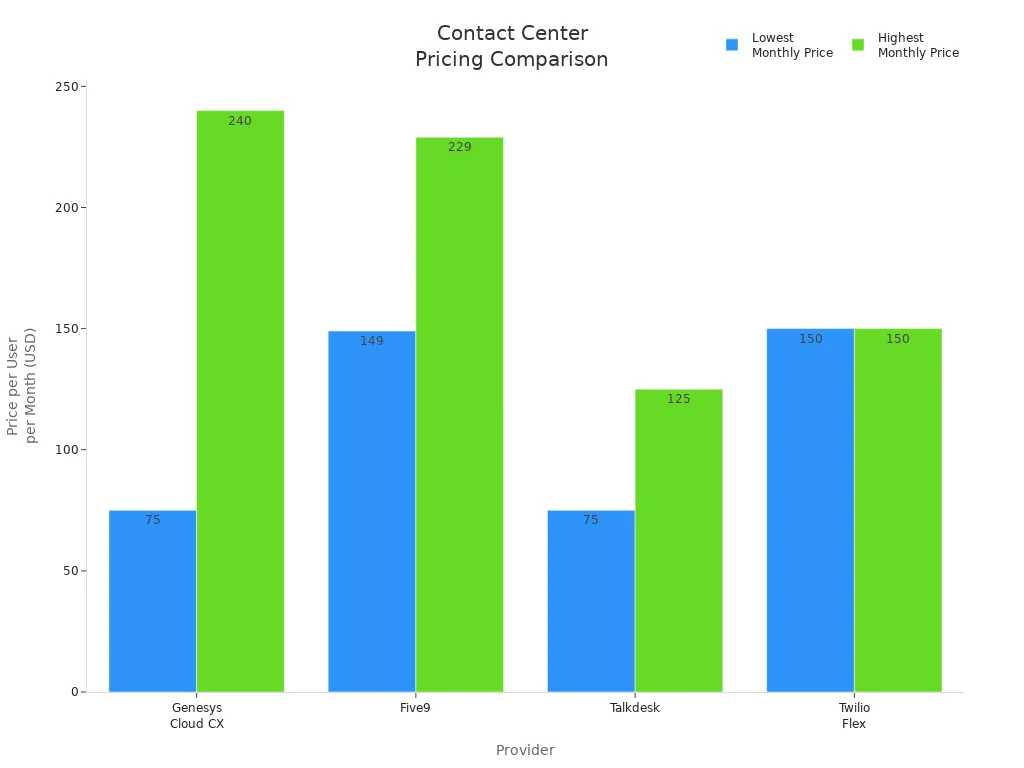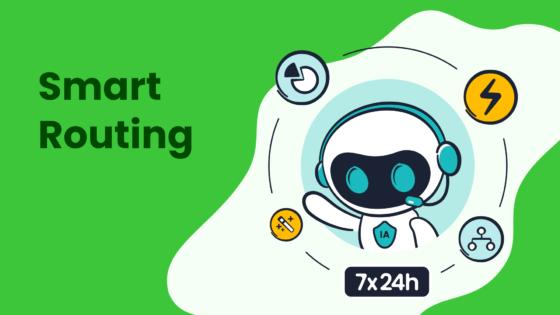Leading Contact Center Software as a Service Providers

Businesses searching for the best contact center software as a service providers often choose names like Sobot, Genesys, Five9, NICE, Talkdesk, and Zendesk. These platforms lead the market due to their reliability, omnichannel support, strong AI features, and scalability. Cloud-based deployment now dominates, offering cost-efficient solutions for businesses of all sizes. Sobot stands out for its innovation, customer-centric approach, and efficient Sobot AI. Companies value Sobot call center for seamless business communication and advanced customer service and support. Comparing providers helps businesses find the right contact center as a service with true omnichannel support.
Top Contact Center Software as a Service Providers
Quick Comparison Table
Selecting the right contact center software as a service can transform how businesses connect with customers. The table below compares leading cloud contact center and call center software providers, focusing on features, pricing, scalability, and best use cases. For more details, see Gartner’s Magic Quadrant for Contact Center as a Service.
| Provider | Key Features | Pricing (per user/month) | Reliable Scalability | Best Use Cases |
|---|---|---|---|---|
| Sobot | Omnichannel support, AI automation, 99.99% uptime, global telephony | Custom, scalable plans | Enterprise-grade | Global, omnichannel businesses |
| Genesys Cloud CX | Omnichannel routing, AI, analytics | $75–$150+ | High | Large enterprises |
| Five9 | Predictive dialer, IVR, CRM integration | $149+ | High | Sales, support teams |
| Talkdesk | Omnichannel, AI Copilot, integrations | $85–$165 | High | Customer-centric organizations |
| NICE CXone | Workforce optimization, analytics, AI | Custom | Enterprise-grade | Complex, regulated industries |
| Zendesk | Ticketing, chat, multichannel | $49–$99 | Moderate | SMBs, e-commerce |
| Amazon Connect | Pay-as-you-go, AI, open APIs | Usage-based | High | Flexible, cloud-based solutions |
| Vonage | Voice, video, messaging, CRM integration | $19–$39 | Moderate | SMBs, remote teams |
| Dialpad | AI voice, video, messaging | $23–$35 | Moderate | Hybrid, remote workforces |
| Salesforce Service Cloud | CRM, omnichannel, automation | $25–$300 | Enterprise-grade | CRM-driven businesses |
Note: Pricing and features may vary by region and plan. For the latest details, visit each provider’s official website.
Selection Criteria
Businesses should evaluate contact center software using several important criteria:
- Omnichannel support: Manage customer interactions across voice, chat, email, and social media in one platform. This ensures a seamless customer journey.
- CRM integration: Connect call center software with existing CRM systems for efficient data use and personalized service.
- Cloud-based solutions: Enable remote work, global reach, and reliable scalability without heavy infrastructure.
- Outbound campaign management: Features like click-to-call and auto-dialing boost agent productivity.
- Reporting and analytics: Track metrics such as call length, first call resolution, and agent utilization to improve performance.
- Uptime and SLAs: Look for cloud contact center providers with 99.9% or higher uptime and clear service level agreements. These protect businesses from costly downtime (source).
- Security and compliance: Ensure the cloud-based solution meets industry standards for data protection.
Scalable plans, AI-driven self-service, and real-time monitoring help businesses adapt as they grow. Choosing the right contact center software as a service means finding a balance between features, cost, and reliable scalability.
Provider Reviews
Sobot Voice/Call Center

Sobot Voice/Call Center stands out as a robust call center software solution trusted by global enterprises. The platform delivers a stable, cloud-based environment with 99.99% uptime, ensuring businesses maintain reliable operations at all times. Sobot supports fast integration with CRM and technology management systems, allowing companies to deploy the system within minutes. The unified agent workspace improves agent efficiency and collaboration, making it easier to deliver efficient customer support.
Key features include:
- Intelligent IVR for custom greetings and menu building
- Automatic call distribution (ACD) and smart call routing
- Real-time monitoring and analytics for performance tracking
- AI-powered voicebots for 24/7 customer engagement
- Global phone number availability and encrypted data transfer
- Flexible SaaS licensing for cost optimization
- All-in-one solution with phone numbers, SMS, WhatsApp, and phone sets
Sobot’s platform is user-friendly and suitable for businesses of all sizes. Companies benefit from a 48% increase in reception efficiency, a 41% reduction in average handle time, and a 54% improvement in first-contact resolution rate. The network spans 110 sites in 93 cities across 50 countries, providing 24/7 global support.
Customer Success Story: Opay
Opay, a leading financial service platform, partnered with Sobot to unify its customer service and marketing channels. After implementing Sobot’s omnichannel solution, Opay increased customer satisfaction from 60% to 90%, reduced costs by 20%, and improved conversion rates by 17%. The intelligent IVR system enabled 60% of customers to resolve issues independently, demonstrating the power of AI-driven call center software.
| Customer | Industry | Results Achieved |
|---|---|---|
| Opay | Financial Services | 90% CSAT, 20% cost reduction, 17% higher conversion |
| Robylon | Collections | 25% more collections, 30% cost reduction, 90% automation |
| Logistics Client | Logistics | 95% reduction in query resolution time |
Sobot’s call center software helps businesses achieve efficient customer support, automate routine tasks, and scale globally with ease.
Genesys Cloud CX
Genesys Cloud CX is a leading contact center software platform designed for large enterprises with complex needs. The system excels in omnichannel orchestration, allowing agents to manage voice, chat, email, SMS, and social messaging from a single interface. Genesys leverages AI for predictive engagement, intelligent routing, and real-time sentiment analysis. The Workforce Engagement Management suite covers forecasting, scheduling, quality management, and gamification.
Key features:
- True omnichannel routing with full customer history
- AI-powered predictive routing and agent assistance
- Real-time analytics and automated quality management
- Open API architecture for flexible integrations
- Workforce management tools for scheduling and coaching
Best use cases include large organizations with advanced automation needs, global businesses requiring multi-site support, and companies focused on customer journey orchestration.
| Plan Name | Price (per user/month) | Features Included |
|---|---|---|
| Cloud CX 1 | $75 | Voice only, intelligent routing, IVR, reporting, open API |
| Cloud CX 2 | $95 | Digital channels (email, chat, SMS, messaging apps), analytics |
| Cloud CX 3 | $135 | Digital + Workforce Management, AI scheduling, analytics |
| Cloud CX 4 | $240 | Voice + Digital + Workforce Management + AI Experience Orchestration |

Genesys Cloud CX is ideal for enterprises seeking advanced call center software with strong AI and analytics capabilities.
Five9
Five9 is a cloud-based call center software platform known for its advanced automation and omnichannel communication. The system offers customizable IVR scripts, skills-based and predictive routing, and AI-driven chatbots. Five9 integrates with popular CRMs like Salesforce and Microsoft Dynamics, enabling personalized customer support.
Key features:
- IVR with speech recognition and natural language processing
- Predictive dialer and intelligent call routing
- Omnichannel support: voice, email, chat, SMS, social media
- Real-time analytics and quality management dashboards
- Workforce management for scheduling and forecasting
- Strong security and compliance (GDPR, HIPAA, PCI DSS)
Five9 supports remote agents and is widely used in industries such as healthcare, retail, and financial services. The platform helps automate call routing, manage customer inquiries, and monitor agent performance.
Pricing ranges from $149 to $229 per user per month, depending on the feature set. Five9 is best suited for organizations that require robust call center software with advanced automation and integration capabilities.
Talkdesk
Talkdesk is a modern contact center software solution recognized for its deep vertical integration, especially in healthcare. The platform offers industry-specific workflows, templates, and seamless integration with systems like Epic. Talkdesk invests heavily in AI innovation, providing generative AI tools and proprietary capabilities to enhance agent efficiency.
Key features:
- Omnichannel support with voice, chat, email, and social media
- Industry-specific solutions and compliance adherence
- AI-powered agent assist and workflow automation
- Customer success teams for proactive support and education
- Easy-to-use interface with rapid deployment
Talkdesk is a strong choice for businesses in regulated industries or those seeking tailored call center software. Pricing typically ranges from $75 to $125 per user per month, depending on the plan and features.
NICE CXone
NICE CXone is a cloud-native contact center software platform offering omnichannel routing, AI-powered journey orchestration, and smart self-service. The system empowers agents with real-time data and guidance, while advanced analytics drive continuous improvement.
Key features:
- Digital entry points via web, mobile, and search
- AI-powered chatbots and proactive outreach
- Real-time agent support and performance analytics
- Workforce engagement management and automated summaries
- Open cloud foundation for flexibility and scalability
NICE CXone integrates with major CRMs like Salesforce, Oracle, and Zendesk. The platform scales effortlessly, supporting growing teams and increasing call volumes without downtime. NICE CXone is ideal for enterprises needing reliable, scalable call center software with advanced automation.
Zendesk
Zendesk is a popular customer support platform that includes call center software features through Zendesk Talk. The system offers a robust ticketing system, multi-channel communication, and AI-powered bots for automation. Zendesk supports email, chat, phone, and social media, providing a unified customer support experience.
Key features:
- Comprehensive ticketing and workflow management
- Omnichannel support: chat, email, phone, social media
- AI-powered automation for quick responses
- Real-time analytics and customizable dashboards
- Extensive integrations and API access
- Strong security and compliance features
Zendesk’s pricing starts at $19 per user per month for basic plans, with advanced features and add-ons available at higher tiers. The platform suits small to medium businesses seeking efficient customer support and scalable call center software. Larger organizations may require higher-tier plans for advanced customization and analytics.
| Plan | Price (per user/month) | Key Features |
|---|---|---|
| Support Team | $19 (annual) / $25 (monthly) | Basic tools, email ticketing, integrations |
| Support Professional | $55 (annual) / $69 (monthly) | SLA management, advanced reporting, phone support |
| Support Enterprise | $115 (annual) / $149 (monthly) | Skills-based routing, multi-brand support |
Note: Add-ons such as Workforce Management and Advanced AI are available at extra cost.
Amazon Connect
Amazon Connect is a scalable, cloud-based call center software platform built on AWS infrastructure. The system provides telephony services in over 150 countries, with direct inward dial and toll-free numbers. Amazon Connect supports omnichannel communication, including voice, SMS, email, web chat, and social media.
Key features:
- Drag-and-drop workflow designer for custom call flows
- AI-powered IVR and chatbot integration
- Real-time dashboards and analytics
- Skills-based routing and outbound campaigns
- Secure call recording and compliance with GDPR and HIPAA
- Integration with AWS services and third-party CRMs
Amazon Connect uses a pay-as-you-go pricing model, making it cost-effective for businesses of all sizes. The platform enables rapid agent onboarding and scales easily to handle fluctuating call volumes. Use cases include agent assist, manager assist, and customer self-service, all powered by AI and machine learning.
Amazon Connect is ideal for organizations seeking flexible, global call center software with strong integration and automation capabilities.
Key Features of Contact Center Software

Omnichannel Support
Omnichannel support stands as a cornerstone of modern contact center software. Leading providers integrate multi-channel support, allowing customers to switch between voice, chat, email, and social media without losing context. This unified approach improves customer experience management by streamlining customer interactions and boosting agent productivity. Industry reports show that 25% of contact centers now use dedicated omnichannel routing tools, reflecting a strong trend toward unified platforms. Businesses benefit from seamless transitions and consistent customer engagement, which leads to higher customer support quality and satisfaction.
AI and Automation
AI and automation have transformed call center software. Providers offer real-time agent assist, sentiment analysis, and customer intent recognition. These tools help agents respond quickly and accurately, improving customer support quality and customer experience management. AI-driven analytics extract actionable insights from every interaction. Automation features, such as chatbots and auto-categorization, handle routine tasks and free agents to focus on complex issues. The table below highlights common AI capabilities:
| AI Capability | Description |
|---|---|
| Real-Time Agent Assist | Provides instant answers and suggestions |
| Sentiment Detection | Analyzes customer emotions for better responses |
| Voice Bots and Chatbots | Automate routine inquiries |
| Auto Summarization | Organizes and summarizes calls |
| Conversational AI | Maintains context for natural exchanges |
Integration Capabilities
Integration capabilities enable contact center software to connect with popular CRM and business tools. Providers support seamless workflows by linking platforms like Salesforce, Google Workspace, and Slack. This integration creates a unified view of customer interactions, enhancing customer experience management and multi-channel support. Quick setup and computer-telephony integration (CTI) allow agents to access customer history, personalize service, and reduce frustration.
Security and Compliance
Security and compliance remain critical for call center software. Providers meet standards such as SOC 2, ISO/IEC 27001, PCI DSS, and HIPAA. These certifications ensure data protection, risk mitigation, and trust across industries. Access controls, encryption, and network security measures protect sensitive customer data. Contact centers must align with local and sector-specific regulations to maintain customer support quality and avoid penalties.
Analytics and Reporting
Analytics and reporting features provide valuable insights for customer experience management. Businesses use real-time dashboards and customizable reports to monitor performance, track key metrics, and discover improvement opportunities. Advanced analytics, including speech and predictive analytics, help optimize staffing and enhance customer engagement. Integration with CRM systems supports unified data access, empowering agents and managers to make informed decisions and improve customer interactions.
Tip: Access to hundreds of preset reports and AI-driven analytics helps organizations identify trends, coach agents, and proactively address issues, driving continuous improvement in customer support.
Benefits of Contact Center as a Service
Scalability
Contact center as a service platforms deliver reliable scalability for businesses of all sizes. Companies can easily add or remove agents as demand changes. This flexibility supports seasonal spikes or rapid growth without the need for new hardware. Scalable plans allow organizations to pay only for what they use. As a result, businesses can expand their call center software capabilities quickly and efficiently. Recent industry research shows that CCaaS solutions help companies adjust to changing customer needs and market conditions.
Cost Efficiency
Cloud-based contact center as a service models reduce upfront investments. Businesses avoid the high costs of purchasing and maintaining hardware. The subscription model shifts expenses from capital to operational, making budgeting easier. Providers handle updates and maintenance, which lowers IT workload. Companies benefit from efficient customer support without hidden fees. This approach helps organizations of all sizes access advanced call center software features at a predictable cost.
Enhanced Customer Experience
Contact center as a service platforms improve customer experience through advanced analytics and AI-driven tools. These systems offer omnichannel communication, allowing customers to reach support through voice, chat, email, or social media. AI and machine learning personalize interactions and automate routine tasks. Businesses gain insights from real-time data, which helps agents deliver efficient customer support. Companies using CCaaS report higher satisfaction scores and faster resolution times.
Note: CCaaS platforms continuously update with the latest features and security enhancements, ensuring businesses always provide top-tier customer experience.
Flexibility and Remote Work
Contact center as a service enables teams to work from anywhere. Cloud-based call center software supports remote and distributed workforces. Managers can monitor performance and provide coaching in real time. Employees access the same tools and data, whether in the office or at home. This flexibility helps companies attract talent and maintain efficient customer support across locations. The ability to adapt quickly to remote work has become essential in today’s business environment.
Choosing the Best Cloud Contact Center Solution
Assessing Business Needs
Businesses should start by identifying their unique requirements. Each organization has different goals for customer service, sales, or support. Leaders must list the channels they want to support, such as voice, chat, or social media. They should also consider the volume of interactions and the need for features like AI automation or analytics. A clear understanding of business communication needs helps align the cloud contact center with company objectives.
Comparing Features
Next, businesses compare the features offered by each cloud-hosted software provider. Key aspects include omnichannel support, intelligent routing, real-time analytics, and AI-powered automation. Companies should look for solutions that offer a unified workspace and strong security. Sobot, for example, delivers seamless integration and supports global business communication, making it a strong choice for enterprises with international operations.
| Feature | Importance | Sobot Example |
|---|---|---|
| Omnichannel Support | High | Yes |
| AI Automation | High | Yes |
| Global Telephony | Medium | Yes |
| Real-Time Analytics | High | Yes |
Evaluating Integrations
Integration with existing systems is critical. Businesses should check if the cloud contact center connects easily with CRM, ERP, or marketing tools. Sobot offers fast and reliable integration, which helps global businesses unify their workflows. Seamless integration reduces manual work and improves agent productivity.
Pricing and Support
Cost plays a major role in decision-making. Companies must review all pricing details, including hidden fees and ongoing expenses. Support quality also matters. Reliable providers offer 24/7 assistance and clear service level agreements. Businesses benefit from transparent pricing and strong customer support, ensuring smooth operations.
Free Trials and Demos
Testing the platform before committing is essential. Most providers offer free trials or demos. Businesses should involve agents and supervisors in these tests to gather feedback on usability and functionality. This step helps confirm that the cloud-based business communication platform meets real-world needs.
Tip: A structured approach—defining needs, comparing features, checking integrations, reviewing pricing, and testing demos—ensures businesses select the best cloud contact center for their goals.
Improving Customer Experience with Contact Center Software

Personalization
Contact center software now enables businesses to deliver personalized experiences at scale. Companies use advanced tools to analyze customer interactions and tailor responses to individual needs. Personalized greetings, recommendations, and follow-ups create a sense of value for each customer. AI-driven systems help agents access customer history and preferences, making every conversation more relevant. Personalized interactions increase satisfaction and loyalty, as 93% of customers are more likely to return after excellent service. Customer experience management platforms use these insights to refine engagement strategies and improve outcomes.
Self-Service Options
Modern contact centers offer a self-service portal that empowers customers to resolve issues independently. Features like AI chatbots, knowledge bases, and automated IVR systems provide quick answers without agent intervention. Businesses see higher efficiency and reduced costs when customers use self-service options for routine inquiries. A self-service portal also supports personalized solutions by guiding users based on their history and preferences. Customer experience management improves as customers enjoy faster resolutions and more control over their support journey. Companies report that workflow automation and self-service tools maintain high performance during peak times.
Real-Time Insights
Real-time insights play a crucial role in customer experience management. Contact center software provides dashboards that track key metrics such as satisfaction, handle time, and resolution rates. Supervisors monitor agent performance and customer interactions instantly, allowing for immediate coaching or intervention. AI and machine learning analyze conversations to identify trends and optimize processes. These insights help businesses personalize service, reduce average handle time by up to 25%, and increase first-contact resolution rates. Customer experience options expand as companies use data to adapt quickly and meet evolving needs.
Case Study: Opay and Sobot
Opay, a financial service platform, partnered with Sobot to enhance customer experience management. By integrating Sobot’s omnichannel solution, Opay unified customer interactions across social media, email, and voice. The self-service portal and intelligent IVR enabled 60% of customers to resolve issues without agent help. Real-time insights from Sobot’s analytics improved agent productivity and reduced operational costs by 20%. Opay’s customer satisfaction rate rose from 60% to 90%, and conversion rates increased by 17%. This case highlights how personalized, data-driven solutions transform customer experience.
Leading contact center software as a service providers, such as Sobot, Genesys, and Five9, deliver reliability, scalability, and advanced AI features. Businesses should match solutions to their customer experience goals and operational needs. The comparison table and selection guide help readers make informed choices.
Tip: Test demos or free trials—including Sobot’s offerings—to evaluate which contact center software as a service fits best before making a commitment.
FAQ
What is contact center software as a service?
Contact center software as a service (CCaaS) is a cloud-based platform that helps businesses manage customer interactions across channels like voice, chat, email, and social media. Companies use CCaaS to improve customer support, boost efficiency, and scale operations without heavy IT investment.
How does omnichannel support benefit businesses?
Omnichannel support lets agents handle customer conversations from multiple channels in one place. This approach reduces response times and increases customer satisfaction. For example, Sobot’s omnichannel solution helped Opay raise its customer satisfaction rate from 60% to 90%.
Is contact center software as a service secure?
Yes. Leading providers use encryption, access controls, and compliance certifications like SOC 2 and PCI DSS. These measures protect customer data and help businesses meet industry regulations. Sobot, for instance, ensures encrypted data transfer and 99.99% uptime for global clients.
Can contact center software as a service integrate with CRM systems?
Most contact center software as a service platforms offer seamless integration with popular CRM tools. This integration allows agents to view customer history and personalize service. Sobot supports fast CRM integration, helping businesses unify workflows and improve agent productivity.
What are the main benefits of using contact center software as a service?
Businesses gain scalability, cost savings, and flexibility. They can add or remove agents easily, support remote work, and access advanced features like AI automation. Companies using CCaaS report higher customer satisfaction and lower operational costs.
See Also
Best Cloud-Based Contact Center Services Evaluated For 2024
Leading Contact Center Platforms Analyzed For 2024
Best No-Cost CRM Software For Call Centers 2024
Comprehensive Guide To Omnichannel Software For Call Centers
